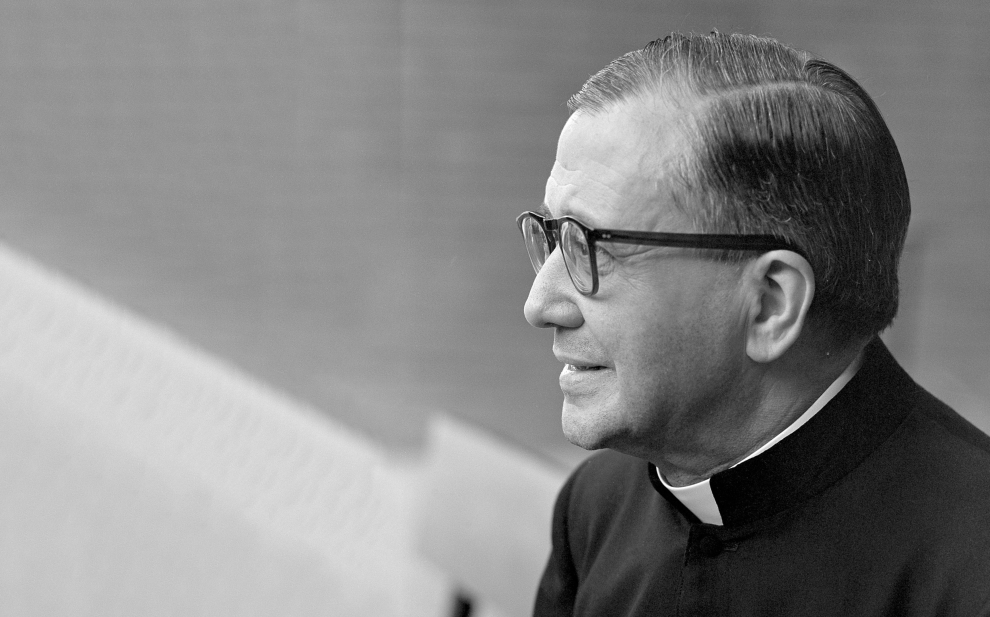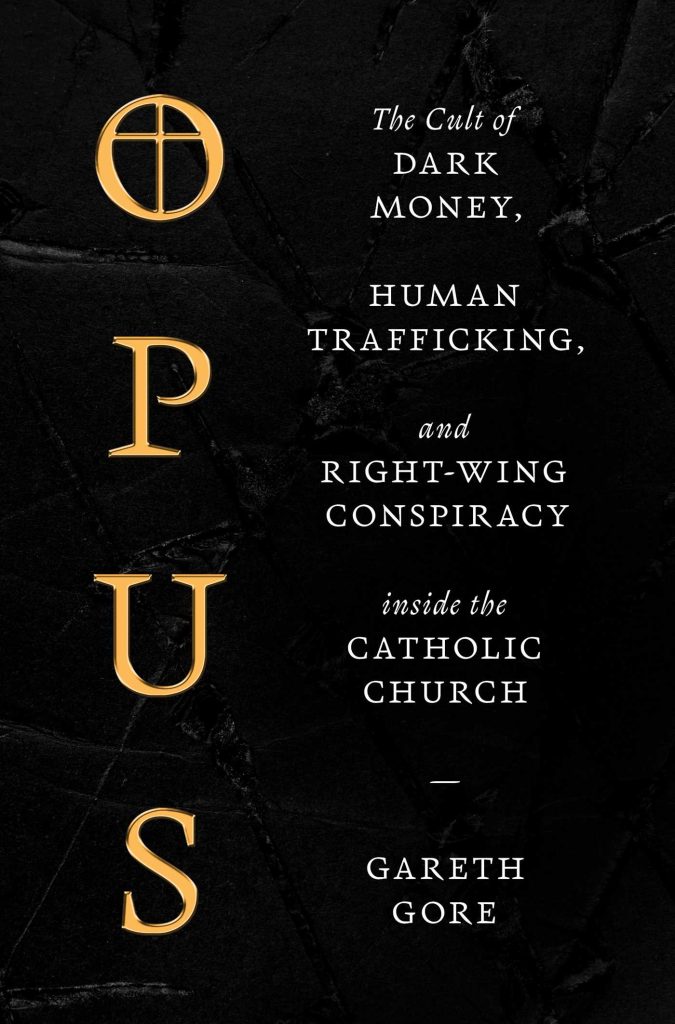Opus: The Cult of Dark Money, Human Trafficking, and Right-Wing Conspiracy inside the Catholic Church
By Gareth Gore (Simon & Schuster, 2024)
My personal experience with Opus Dei as an undergraduate and in my professional career was typical of many of others my age at the time. As a conservative Catholic, I appreciated the order’s focus on the layperson’s potential to explore spirituality in their everyday working lives and its emphasis on traditional forms of devotion: meditations in the chapel on Saturday evenings, followed by benedictions and social dinners with fellow students and professionals. (My one disappointment was that these gatherings were male-only. Women interested in Opus Dei were directed to separate centers, something that I discovered was fundamental to the prelature’s way of operation.)
Even when I became aware of the sect’s more stringent demands of its lay members who chose to devote their lives and careers as so-called “numeraries” to Opus Dei, I reasoned it was not unlike the traditions of other religious orders and movements in the long history of the church through the centuries. Over the subsequent years, I read superficially about controversies surrounding Opus Dei, its founder Josemaria Escriva (canonized in 2002 by Pope John Paul II) and its origin during Spain’s Franco regime. I had and still have friends in the sect, though some also left it. But once I’d left, I did not pay much attention to Opus Dei—until people began discussing its deep involvement in U.S. politics and connections with the Trump administration. People even began to speculate about whether Opus Dei is a cult.
Financial journalist Gareth Gore’s new book, Opus: The Cult of Dark Money, Human Trafficking, and Right-Wing Conspiracy Inside the Catholic Church (Simon & Schuster) is quite frankly shocking. It’s also a much-needed exposé of what looks very much like a cult within the Catholic Church—every bit as reckless and dangerous as the late Marcel Maciel’s Legionaries of Christ, before it was finally reformed by Pope Benedict.
Opus Dei has issued a press release claiming that Gore misled them about his aims in writing the book and that it is largely fabricated. Nevertheless, it’s clear from Gore’s own detailed notes and the extensive hours he spent interviewing both members and former members that financial and political scandal has dogged the movement since its very beginning.
Gore recounts that Escriva, not long before his death in 1975, was flown in a helicopter to view the progress of a giant shrine being constructed at Torreciudad. Ostensibly dedicated to the Virgin Mary, it was in fact a grandiose monument to the ailing founder and his movement. It included a basilica, four chapels, conference halls, a museum, a bell tower, and courtyard. “Only we Opus Dei crazies can do this,” Escriva is reported to have said, “and we are very happy to be crazy.”
The building of the shrine was likely made possible by the millions of dollars funneled to Opus Dei by Spain’s largest bank, Banco Popular, through seemingly innocuous companies with no official ties to Escriva’s movement. But Gore writes that a small cadre of Opus Dei members controlling the bank established the network of outlets to feed Opus Dei’s expansion, first in Spain, and then in Europe and the Americas.
The true extent of Opus Dei’s control of Banco Popular would only emerge after its spectacular collapse in 2017, when Gore discovered key documents from the bank’s archives that members of the movement had apparently failed to purge from the mansion where the bank’s deceased chairman, Luis Valls-Taberner, a lifelong numerary in Opus Dei, had lived. What began as a financial reporting assignment turned, over several years, into something much bigger. In 14 chapters, Gore lays out the details that he found, telling the extraordinary story of a small Spanish sect that, with the help of the Franco regime, quickly learned how to excel in financial and political corruption.
The numeraries were Escriva’s front line of support from the very beginning. At first only men of professional class with good incomes, like Valls-Taberner, were recruited. They were sworn to a life of celibacy and obedience, though they could live and work in the world. (Only later, Escriva reluctantly agreed to welcome women.) Valls-Taberner was so successful at helping Escriva raise the funds he needed to house the growing movement (including the opulent Villa Tavere in Rome where Escriva took up residence), that Escriva referred to him as “my Saint Nicholas.”
In private, Gore writes, Escriva was given to fits of rage, and open contempt for popes John XXIII and Paul VI. As Gore shows in a depiction of one revealing meeting between the two, it seems Pope Paul saw through Escriva from the beginning.
Escriva, according to Gore, was fixated on control and expected his new order of Opus Dei priests to share what they learned in the confessional as a way of creating and controlling detailed records of its members. At Villa Tavere, Escriva had microphones installed in the rooms of guests and numeraries so that he could listen in on conversations. Numeraries who confessed to doubts about their vocations or their allegiance to the organization, or to any signs of anxiety or depression, were heavily medicated by doctors who belonged to Opus Dei.
Perhaps the most disturbing revelation in Gore’s book is about Opus Dei’s calculated recruitment and trafficking of poor and uneducated women from poverty-stricken regions of South America to serve as lifelong indentured servants for its numerary residences throughout the world. As of this writing, four of its most senior priests face trial for trafficking women in Argentina, even as the Vatican begins its own investigation.
Escriva’s misogyny was striking even for the times in which he lived. He officially created an underclass of women members, “numerary assistants,” whose vocation would be to spend their entire lives serving the needs of men they could never lay eyes on. “Before she ‘only’ peeled potatoes,” he wrote, “but now she attains holiness by peeling potatoes.”
As bad as the collapse of Banco Popular was for Opus Dei in Spain, the sect had already created a new network of foundations and companies in the United States to support ongoing recruitment there.
The most notorious figure in the American Opus network was the late Father C. John McCloskey, a former Wall Street broker turned priest of the prelature. In 1998, he was appointed the head of the Catholic Information Center (CIC) in Washington, D.C. Initially a modest chapel and bookstore entrusted to Opus Dei, the CIC, under McCloskey, became a central meeting place for high profile conservative Catholics working in the nation’s capital. He became famous for the conversions of right-wing politicians and scholars: the likes of Newt Gingrich, Senator Sam Brownback, and the late Judge Robert Bork. McCloskey also became a regular commentator on shows like CNN’s Crossfire, NBC’s Nightly News, Dateline, and Meet the Press, where he inveighed against “the culture of death,” contraception, IVF, and abortion, famously insisting that no Catholic could vote for Democrats with a clear conscience.
Around 2002, as the clergy abuse scandal was turning the American Catholic church inside out, McCloskey suddenly disappeared from public view. It would only come out in 2019 that he had been removed from his post at the CIC after a married woman member of Opus Dei sought legal action over his aggressive sexual overtures to her in private counseling sessions. Members of Opus Dei at first assured the woman that McCloskey would no longer serve in active ministry and settled the case for just under a million dollars. When she discovered that McCloskey was not only in active ministry but hearing confessions, she went public with her story. McCloskey, a heavy drinker, died of early Alzheimer’s at a home for priests in early 2023.
Even without McCloskey, the CIC has continued to be a magnet for conservative U.S. Catholics, including Leonard Leo, a leading member of the Federalist Society, which is dedicated to installing ultra-conservative judges in the federal courts and ultimately on the supreme court. According to Gore, in his chapter on Opus Dei’s connections in American politics, the overturning of Roe v. Wade would not have been possible without the direct involvement of Opus Dei insiders working for Trump and longtime Catholic influencers like Leo. With Trump’s re-election, their involvement will only deepen through their connections with the authors of Project 2025, spearheaded by the Heritage Foundation. Its President Kevin Roberts is a patron of Opus Dei’s Catholic Information Center where he receives regular spiritual guidance.
Reading through Gore’s engrossing accounts of the wheeling and dealing of this secretive organization, one is struck by the stupefying levels of financial and material venality on one hand and the relative banality of Escriva’s program of spirituality on the other. This is not simply Gore’s assessment. The great Swiss theologian Hans Urs von Balthazar once dismissed Escriva’s The Way as the spiritual equivalent of a guidebook for senior scouts.
If Gore’s assessments are accurate, the whole point of establishing Opus Dei from the beginning seems to have been for its founder’s material and spiritual aggrandizement. And the movement’s devotion to secrecy seems to have grown out of its founder’s lifelong predilection for furtiveness, dissembling, and dishonesty—which Escriva was never shy about encouraging in his writings.
Many Catholics of various political ideologies do seek for ways to live out their faith in their everyday work and life, as Opus Dei preached they should do. If there’s a moral here for those of us looking for ways to integrate these different areas of our life, maybe it is a warning: Money and power can undermine and corrupt even the best spiritual intentions.
Image: Adapted from Wikimedia Commons/Oficina de Información de la Prelatura del Opus Dei en España (CC BY-SA-2.0)
















Add comment